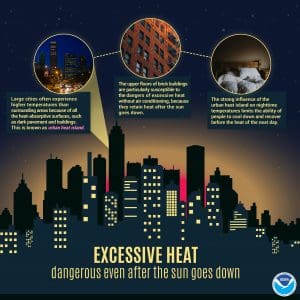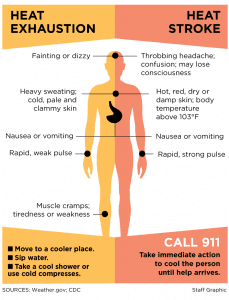 Heat records are frequently breaking and with them come a rise of heat-related illnesses. Most aren’t record-daily highs but record-high nighttime lows, and that lack of cooling can be dangerous, meteorologists say. According to the Centers for Disease Control, extreme heat kills more Americans each year than hurricanes, lightning, tornadoes and floods combined.
Heat records are frequently breaking and with them come a rise of heat-related illnesses. Most aren’t record-daily highs but record-high nighttime lows, and that lack of cooling can be dangerous, meteorologists say. According to the Centers for Disease Control, extreme heat kills more Americans each year than hurricanes, lightning, tornadoes and floods combined.
Elders do not adjust as well as young people to sudden changes in temperature. According to the Centers for Disease Control and Prevention, elders are more likely to have a chronic medical condition that changes the body’s responses to heat and are more likely to take prescription medicines that affect the body’s ability to sweat or control its temperature. Factors that can interfere with a body’s ability to adapt to hot weather include age, obesity, dehydration, heart disease and medications.
Elders are at increased risk for heat-related illnesses and complications. It’s important to know the warning signs of heat-related illnesses and what to do if you notice symptoms.
Heat cramps are muscle pains and spasms, mostly in the legs, caused by dehydration and exertion. Though not life-threatening, heat cramps can be very painful. To prevent and treat heat cramps, drink plenty of cool, non-alcoholic liquids, rest and stay in a cool environment.
Heat exhaustion is caused by heavy sweating and not getting enough fluids to support your vital organs. Symptoms include cool, moist, pale, flushed or red skin; heavy sweating; headache; nausea or vomiting; dizziness; and lack of energy.
 Heat exhaustion is a serious and potentially life-threatening illness, so seek medical attention and take steps to reduce the body temperature and increase hydration. These include moving to a cooler environment; drinking cool, non-alcoholic liquids; loosening or removing clothing; and cooling the body with wet towels or a cool shower or bath.
Heat exhaustion is a serious and potentially life-threatening illness, so seek medical attention and take steps to reduce the body temperature and increase hydration. These include moving to a cooler environment; drinking cool, non-alcoholic liquids; loosening or removing clothing; and cooling the body with wet towels or a cool shower or bath.
Heat stroke is a life-threatening condition in which the individual’s body is no longer able to control its own internal temperature. Signs of heat stroke include hot, red and dry skin; rapid, weak pulse; rapid, short breathing; and high fever.
Heat stroke can also cause disorientation or strange behavior, which may be more difficult to identify in an individual with dementia. Seek emergency medical attention immediately if you suspect you or a loved one is experiencing heat stroke.
During extreme summer weather, check on elders to ensure they are safe and healthy and have the resources to stay that way. Extreme heat should be treated with the same caution and preparation as a summer storm. There should always be enough food and water to last five to seven days and a plan to evacuate or seek help in emergencies.
To stay cool during extremely hot days, drink more water than usual and don’t wait until you’re thirsty to drink. Take cool baths or showers, wear loose-fitting, lightweight clothing and rest frequently. Do not engage in strenuous activities or use the stove or oven to cook — it will make you and your house hotter. Plan outdoor activities for the cooler parts of the day, such as early morning or late evening.
If the temperature in your home is higher than comfortable, seek an air-conditioned environment, such as a store, restaurant, public library, shelter or a family member’s or neighbor’s home. Do not rely on a fan as your main cooling source when it’s very hot outside.
Your area agency on aging can help elders locate and access assistance to stay cool during extreme heat. Resources include cooling centers, access to water, assistance with utilities and more.
Leave a Reply